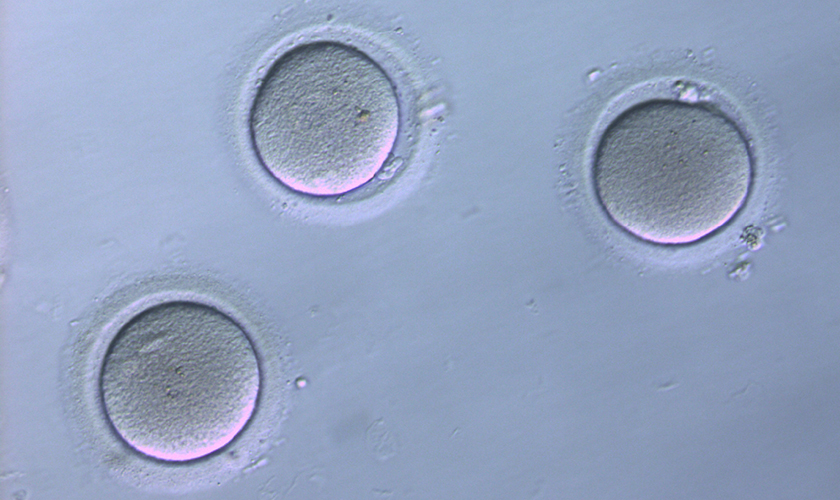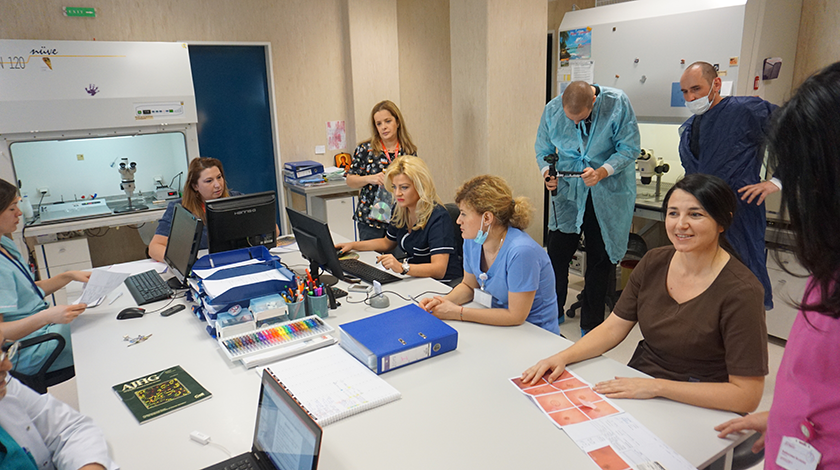
Oocyte cryopreservation - accents
- Vitrification is the most modern and working method of freezing genetic material. In Bulgaria, it is implemented successfully for the first time in 2007 by Dr. Shterev Hospital.
- The embryologists and biologists from Dr. Shterev Hospital take constant care for the frozen chance for a baby of hundreds of couples. Meet the composers of joy in the video below.
- „The recommended age for cryopreservation is 30-33 years when patients own a significant ovarian reserve, and the ovarian reaction to stimulation is excellent”, Tanya Milachich, Ph.D., Head of the IVF department in Dr. Shterev Hospital.
The oocyte is one of the most significant cells in the human body. It is approximately 50 times bigger than the sperm cells and contains genetic material, 96% water and energy substances. The concentration of these substances is so high that this only cell provides with energy the forming of the embryo and its first seven days of splitting. Keeping the integrity of each component of the oocyte is essential for the successful cryopreservation.
What does oocyte cryopreservation mean?
Vitrification is the most modern and working method of freezing oocytes, through which freezing is faster and implemented in unique protective environment cryoprotective substances. This does not allow the forming of water crystals in the oocyte, which could be harmful to its structure. In Bulgaria, it is implemented successfully for the first time in 2007 by Dr. Shterev Hospital.
The collection of the oocytes for cryopreservation happens through a follicular puncture, during which the woman is under full short-term anesthesia. To obtain a higher number of oocytes (at least 6), the woman undergoes Controlled Ovarian Hyperstimulation (COH), which continues approximately 10 to 12 days. Read more about this procedure here.
After the puncture, the oocyte is put in a special substance of cryoprotectants that extract or transform the large water content of the cells into a gel. The oocyte is treated with different solutions, and when the water content in it decreases, it is put in a container at the extreme temperature of -196°C. The cryoprotectants are carefully selected to allow storage of the oocyte in an individual solution and its successful thaw later when the cell successfully absorbs the same amount of water released in the freezing process.
Women should preserve at least ten oocytes to have a real chance for achieving pregnancy because after thaw the survival rate of oocytes is approximately 70-80%. The recommended age for cryopreservation is 30-33 years when patients own a significant ovarian reserve, and the ovarian reaction to stimulation is excellent. By this age, the chances for genetic anomalies in the cell are lower.
When could be advisable?
- For preserving woman’s fertility capacity under the age of 35
- For preserving woman’s fertility capacity after chemo or radiotherapy
- For women with premature lack of ovarian function at an early age
- For women with a family history of premature menopause
- In IVF/ICSI procedure when the partner is prevented from giving semen, which leads to oocyte aging even before their fertilization in the laboratory
- For women planning to postpone childbirth
What are the steps?
Step 1: Preparation tests - ultrasound examination, a blood test for HIV, Syphilis, Hepatitis B & C, microbiology of vaginal discharge, PAP test;
Step 2: Controlled Ovarian Hyperstimulation (COH) and follicular puncture;
Step 3: Conversation with the woman about the quantity and quality of the oocytes, collected for cryopreservation;
Step 4: Filing an Informed Consent for cryopreservation and storage of oocytes, including the desired keeping term;
Step 5: Cryopreservation and storage of the oocytes;
Step 6: After expiring the keeping term and if the women did not indicate extension, the oocytes should be destroyed. If the woman wants to extend this term, it is recommended to express her desire at least 1-2 weeks before the expiring date.
Cryopreservation of genetic material - contact us
Book your appointment for consultation with reproductive specialist from Dr. Shterev Hospital! Call +359 2 920 09 01 or visit our online booking form, or our Viber chanel, and Facebook Messenger.
Meet the reproductive specialist of Dr. Shterev Hospital here.
Video: Our biologists and embryologists
Watch the emotional story about the honorable and inspirational profession of the “composers” of joy - the biologists and embryologists in Dr. Shterev Hospital.
Cryopreservation of genetic material - resume
The innovations and progress of modern medicine give a chance to a lot more couples for conceiving and giving birth to a healthy baby. By virtue of the physicians, embryologists, and biologists every patient has his trusted team, with which help passes through the hard path to the big dream.
 Медицински комплекс „Д-р Щерев”
Медицински комплекс „Д-р Щерев” 